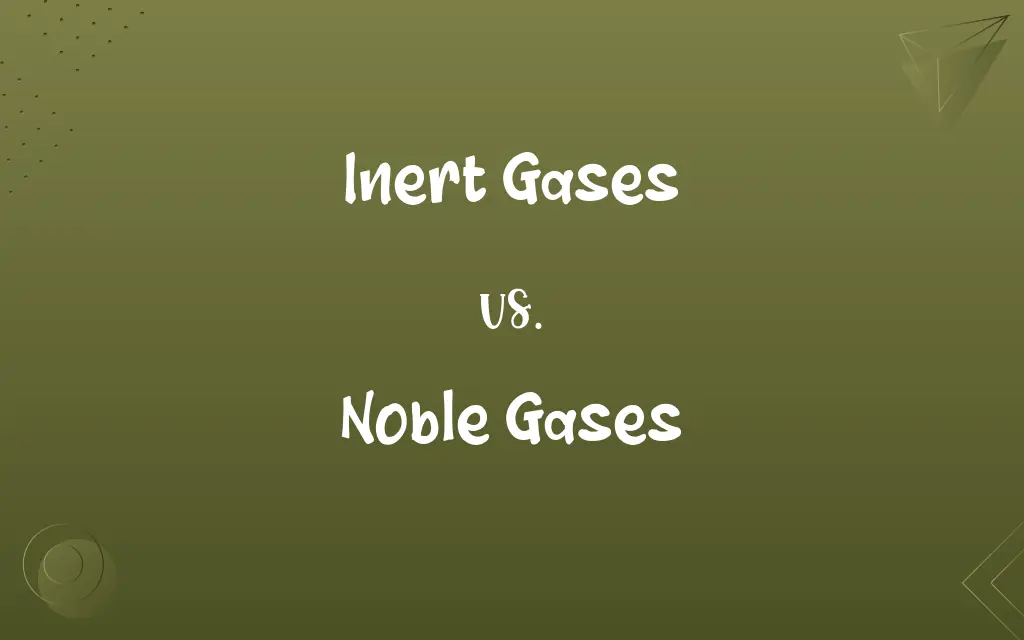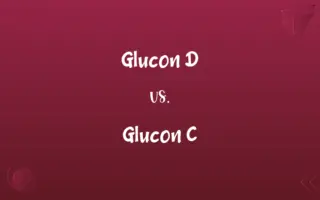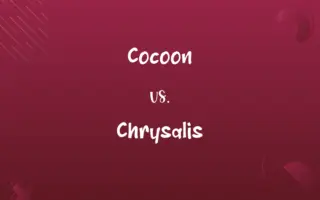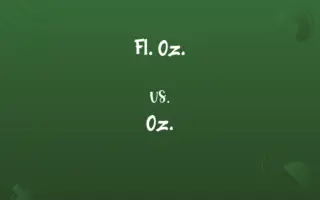Inert Gases vs. Noble Gases: Know the Difference

By Shumaila Saeed || Published on January 10, 2024
Inert gases are elements that do not readily react under standard conditions, while noble gases are a specific group of inert gases in Group 18 of the periodic table.

Key Differences
Inert Gases refer broadly to gases that are not reactive under normal circumstances. This term can sometimes include gases outside the noble gases if they demonstrate inertness. Noble Gases, specifically, are the inert gases found in Group 18 of the periodic table, including helium, neon, argon, krypton, xenon, and radon.
Shumaila Saeed
Jan 10, 2024
Inert Gases have a broader definition and can encompass any gas that resists chemical reactions under standard conditions. This can include gases like nitrogen under certain conditions, despite it not being a noble gas. Noble Gases, on the other hand, are inherently non-reactive due to their full valence electron shells, making them a unique category of inert gases.
Shumaila Saeed
Jan 10, 2024
Inert Gases can be used to describe gases in various industrial applications where non-reactivity is desired, irrespective of their place in the periodic table. Noble Gases, however, are often used in specialized contexts like lighting, welding, and space technology due to their specific properties, such as low boiling points and non-flammability.
Shumaila Saeed
Jan 10, 2024
Inert Gases may sometimes react under extreme conditions or in the presence of powerful reagents. Noble Gases, traditionally considered completely inert, have been observed to form compounds under extreme conditions, although these instances are rare and usually involve heavy noble gases like xenon.
Shumaila Saeed
Jan 10, 2024
Comparison Chart
Definition
Gases that are generally non-reactive
Specific group of inert gases in Group 18
Shumaila Saeed
Jan 10, 2024
ADVERTISEMENT
Composition
Can include gases outside Group 18
Strictly includes He, Ne, Ar, Kr, Xe, Rn
Shumaila Saeed
Jan 10, 2024
Reactivity
Generally non-reactive, with exceptions
Traditionally non-reactive, rare exceptions
Shumaila Saeed
Jan 10, 2024
Industrial Use
Broad applications due to inertness
Specialized uses due to unique properties
Shumaila Saeed
Jan 10, 2024
Inert Gases and Noble Gases Definitions
Inert Gases
Elements known for their lack of chemical bonding.
The inert gas helium is used in balloons because it doesn't react with other elements.
Shumaila Saeed
Dec 17, 2023
ADVERTISEMENT
Noble Gases
A group of chemically inert gaseous elements with high stability.
Noble gases, such as xenon, are used in high-intensity lamps.
Shumaila Saeed
Dec 17, 2023
Inert Gases
Gases that resist chemical reactions under standard conditions.
Argon, an inert gas, is commonly used in light bulbs to prevent filament oxidation.
Shumaila Saeed
Dec 17, 2023
Noble Gases
The most chemically stable group of elements in the periodic table.
Radon, a noble gas, is a naturally occurring radioactive gas.
Shumaila Saeed
Dec 17, 2023
Inert Gases
Gases that typically do not form chemical compounds.
Inert gases are often used in scientific experiments due to their stability.
Shumaila Saeed
Dec 17, 2023
Noble Gases
Elements in Group 18 of the periodic table, characterized by their complete electron shells.
Noble gases like helium are used in cryogenics due to their extremely low boiling points.
Shumaila Saeed
Dec 17, 2023
ADVERTISEMENT
Inert Gases
Elements that do not readily engage in chemical compounds.
Inert gases like neon are used in neon signs due to their lack of reactivity.
Shumaila Saeed
Dec 17, 2023
Noble Gases
Gases known for their exceptional lack of reactivity.
The noble gas argon is used in fluorescent tubes for its inert properties.
Shumaila Saeed
Dec 17, 2023
Inert Gases
Gases with a low level of chemical reactivity.
Inert gases are used in welding to create a non-reactive environment.
Shumaila Saeed
Dec 17, 2023
Noble Gases
Gases that rarely form compounds under normal conditions.
The noble gas neon is popular in lighting for its bright luminescence.
Shumaila Saeed
Dec 17, 2023
Repeatedly Asked Queries
What are inert gases?
Inert gases are elements that are generally non-reactive under normal conditions.
Shumaila Saeed
Jan 10, 2024
Are all noble gases completely inert?
Traditionally, noble gases are considered inert, though some can form compounds under extreme conditions.
Shumaila Saeed
Jan 10, 2024
Are noble gases used in everyday products?
Yes, noble gases are used in products like light bulbs, neon signs, and lasers.
Shumaila Saeed
Jan 10, 2024
Can inert gases be outside Group 18?
Yes, the term inert gases can include elements outside Group 18, like nitrogen in certain conditions.
Shumaila Saeed
Jan 10, 2024
Do noble gases have any color or smell?
Noble gases are colorless, odorless, and tasteless under normal conditions.
Shumaila Saeed
Jan 10, 2024
What defines noble gases?
Noble gases are a specific group of inert gases in Group 18 of the periodic table.
Shumaila Saeed
Jan 10, 2024
Can inert gases react under any conditions?
Some inert gases can react under extreme conditions or with powerful reagents.
Shumaila Saeed
Jan 10, 2024
Can inert gases form compounds?
While generally non-reactive, some inert gases can form compounds under specific conditions.
Shumaila Saeed
Jan 10, 2024
Which gases are classified as noble gases?
Helium, neon, argon, krypton, xenon, and radon are noble gases.
Shumaila Saeed
Jan 10, 2024
Is helium both a noble and inert gas?
Yes, helium is both a noble gas and an inert gas due to its non-reactive nature.
Shumaila Saeed
Jan 10, 2024
Are noble gases found in the atmosphere?
Yes, noble gases like argon and neon are naturally found in the Earth's atmosphere.
Shumaila Saeed
Jan 10, 2024
Why are noble gases used in lighting?
Noble gases are used in lighting for their inertness and unique luminescent properties.
Shumaila Saeed
Jan 10, 2024
Can inert gases be used in medical applications?
Yes, inert gases like helium are used in medical applications like respiratory treatments.
Shumaila Saeed
Jan 10, 2024
Why is helium used in balloons?
Helium is used in balloons because it is lighter than air and non-reactive.
Shumaila Saeed
Jan 10, 2024
Is argon more commonly used than other noble gases?
Yes, argon is widely used due to its abundance and inert properties, especially in industrial processes.
Shumaila Saeed
Jan 10, 2024
Can inert gases conduct electricity?
Inert gases do not conduct electricity in their natural state.
Shumaila Saeed
Jan 10, 2024
Is radon a dangerous noble gas?
Radon is radioactive and can be harmful, particularly in confined spaces where it accumulates.
Shumaila Saeed
Jan 10, 2024
Why are noble gases stable?
Noble gases are stable due to their full valence electron shells, which make them chemically inert.
Shumaila Saeed
Jan 10, 2024
Are all noble gases non-flammable?
Yes, noble gases are non-flammable due to their lack of chemical reactivity.
Shumaila Saeed
Jan 10, 2024
Do noble gases have isotopes?
Yes, noble gases have isotopes, some of which are stable and others radioactive.
Shumaila Saeed
Jan 10, 2024
Share this page
Link for your blog / website
HTML
Link to share via messenger
About Author
Written by
Shumaila SaeedShumaila Saeed, an expert content creator with 6 years of experience, specializes in distilling complex topics into easily digestible comparisons, shining a light on the nuances that both inform and educate readers with clarity and accuracy.































































